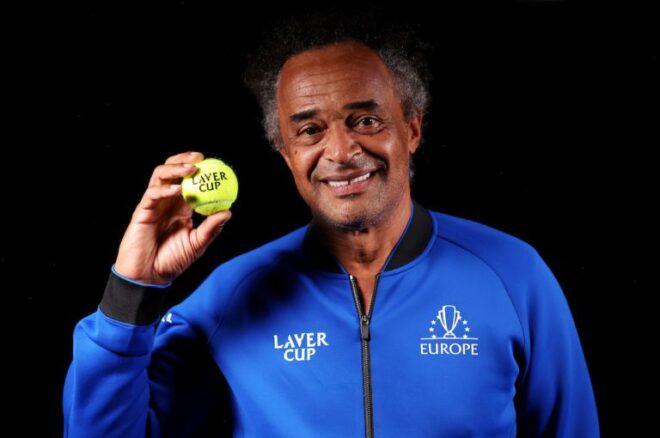
The announcement that Yannick Noah will replace Björn Borg as Europe’s captain at Laver Cup 2025 in San Francisco marks not simply an appointment – but one of the most eagerly awaited comebacks in tennis.
To tennis fans of mature years, Noah is the charismatic French icon who sent Roland-Garros into raptures when he won in 1983 – the last Frenchman to triumph there in the singles. To younger fans, he is much better known as a pop/afro-reggae singer, the man who packed out Paris’s Stade de France to perform to an audience of 80,000. In America he is more known as the father of Joakim Noah, who played college basketball for the Florida Gators and professionally for the Chicago Bulls.
“I’ve been away from the game for a long time,” he said. “I love the game, it’s in my DNA. I’ve been a tennis player since I was a child, so even though I’ve done many things, tennis is my family, and to come back to the family is very important as a person.”
Noah is making his comeback to tennis in a role in which he has excelled. He has the rare distinction of having won both the Davis Cup and Fed Cup (now Billie Jean King Cup) as captain, and his third Davis Cup title came 27 years after his first, during his second spell at the helm. But he knows from that second stint that he has to take a different approach to being Laver Cup captain.
“Tennis changed a lot,” he says, “and social media made a big difference. It was very difficult to have the players one-on-one – it always felt like there was something else outside. So I learned to connect very directly. Sometimes you have to remind them that they are the lucky ones, and this is what we have to transmit to the crowds. We play for the people. We’re ambassadors of tennis.
“My approach is to listen to them. You can have so many ideas about how to coach, but it’s not much what I say, it’s what they understand. They have different backgrounds, different journeys, so I’m excited to know who they are. It’s important at the change of ends to be close to someone you know and trust, so I want to know who they really are.
“I’ve seen [today’s players] from afar. We’re going to have to spend some quality time together, and I want them to enjoy their tennis.
So many times players think: ‘If I win, I’ll be happy’. My philosophy is: ‘Be happy first, and you’ll win’.”
Team sports are in Noah’s blood. His dad was a professional soccer player, and the young Yannick played too.
“One day,” he says, “I told my dad, ‘You know, I miss being in the locker room with a team, I miss being with people.’ My dad said, ‘You don’t understand, you are the luckiest person, you have your own destiny in your hands, if you lose it’s just because of you, if you win it’s because of you – you don’t depend on anybody.’ That was a very important piece of advice.”
Opposing Noah as rival captain will be Andre Agassi. Unlike the outgoing captains Björn Borg and John McEnroe, Noah and Agassi were never rivals, the last couple of years of Noah’s playing career overlapping with the first couple of Agassi’s. Noah recalls seeing a teenaged Agassi at Nick Bollettieri’s tennis academy in Florida, with Bollettieri admonishing Agassi for being late for practice by getting him to wash all the cars in the parking lot. “But he still believed he’d be a great player,” says Noah. “Andre did wash all the cars, and he later became No.1 in the world – I don’t know if there’s a relation between the two!
“I really liked the energy Andre had as a tennis player. Back in the day he had his rock ‘n roll image, he was the free-spirited kid, but when he was No.1, he was Mr Zen, he was so together, so cool. He really worked on it.”
Discovered by Arthur Ashe when he was growing up in Cameroon, Noah has transcended Africa, Europe and North America, and once had an audience with Nelson Mandela. He’s chosen to return to tennis via the Laver Cup – and to bring his philosophy to Team Europe.
“The Laver Cup is special,” he says, “because you can have a lot of players from different countries together in the same team. Sometimes in an individual sport you can get a little lonely. You learn sometimes to hate your opponent. It’s not healthy, but you have to be aggressive and tough. And sometimes you miss the team. That’s why a lot of players love football or basketball for the team locker room. The Laver Cup brings this. We’re going to put all the egos outside, we’re going to put all the competition between each other outside, we’re going to be a team, and we’re going to have this project of winning for Europe.”